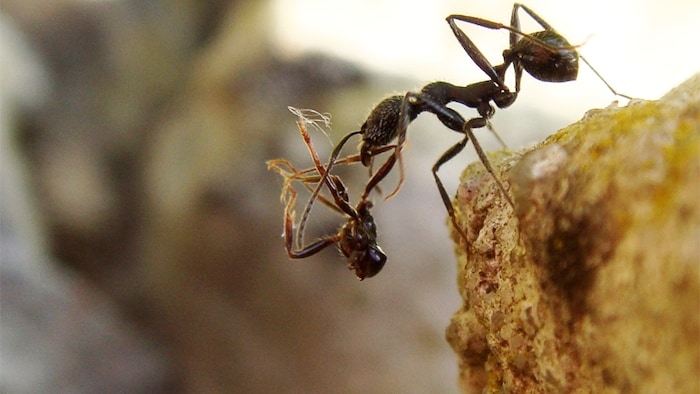Open in full screen mode An Aphaenogaster senilis ant. (Archive photo) Agence France-Presse The “personality” of ants conditions that of their colony, shows a study published in the Biology Letters of the Royal Society(New window) (in English) which supports the hypothesis that the small hymenoptera is resistant to any “social conformism within the very group to which it belongs”. Far from being a homogeneous group of good little soldiers or workers, ant colonies display a variety of behaviors. Just like many groups of so-called social animals. But understanding the interaction between individual and collective behavior remains a major challenge in behavioral and evolutionary biology, note the authors of the study. This is because there is no clear answer to the question of whether an individual's behavior changes when they find themselves in a group, explains to AFP the professor of ethology Patrizia d'Ettorre, specialist in social insects. Loading ELSEWHERE ON INFO: Towards an inevitable coronation of Donald Trump as the Republican nomination? The team of this co-author of the study and researcher at the laboratory of experimental and comparative ethology from the University Sorbonne Paris Nord sought an answer with ants of the species Aphaenogaster senilis. She first subjected a hundred workers to two tests showing the existence of personality traits. These tests measured the propensity of each insect to venture outside the nest – in this case a test tube – and then to venture more or less far into an enclosure. The researchers then formed groups of homogeneous ants based on their more or less exploratory personality, with the idea of seeing if their behavior would change depending on their group membership. They then subjected these groups to tests confronting them with important survival tasks. For example, knowing how to use a tool – soak a small sponge in a sugar solution to bring it back to the nest. Recognize and attack an enemy. Collect tiny dead flies to replenish the nest. Transporting the ant larvae to a new nest when the old one is no longer available. Unsurprisingly, the team found that groups made up of exploring ants were better at all tasks, according to Ettorre's study. On the other hand, in the less adventurous groups of ants, we could expect that certain individuals would move, change their behavior, but this was not the case. In other words, and in agreement with the behavioral type hypothesis, the experiment showed that the personality of the ant does not change when it finds itself in a group, explains Father d'Ettorre. However, in a colony, these less adventurous ants must have a use, underlines the researcher who has been studying social insects for 30 years. If the An unadventurous ant does not have such a great use for critical tasks, it must have one for other tasks as essential to the life of the colony. This is why it would be interesting in the future to form heterogeneous groups to test their performance compared to homogeneous groups, says Professor d'Ettorre.< /p> Because each ant excels at at least one task and very few are gifted at several. Thus, in its study, the LEEC team identified only five elite workers out of 280, capable of participating in at least three of the four test tasks.< /p>
Towards an inevitable coronation of Donald Trump as the Republican nomination?
The “personality” of the ants determines that of their colony

